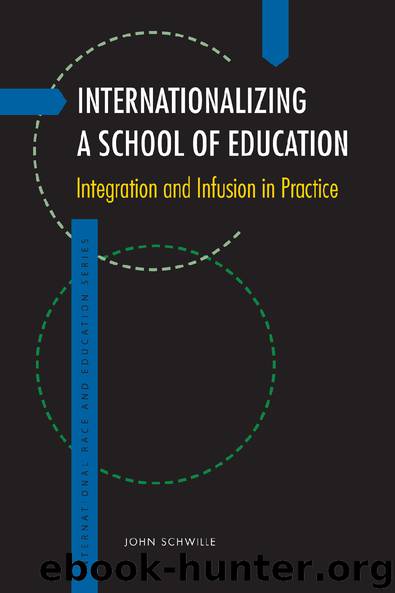Internationalizing a School of Education: Integration and Infusion in Practice by Schwille John

Author:Schwille, John [Schwille, John]
Language: eng
Format: epub
ISBN: 9781628952759
Publisher: Michigan State University Press
NOTES
* Zhao, 2009, 2012 (although the latter book did not come out until after he left MSU ).
†Zhaolearning.com
‡www.experiencechinese.com.
§http://experiencechinese.com/index.php/programs/immersion.
|| http://education.uoregon.edu/users/yongzhao.
* * *
Slow Progress in Internationalization of College Courses
Progress remained slow even though MSU ’s transition from a quarter system to a semester system in the 1990s created unprecedented openings for courses with more international content. This change passed by only one vote when submitted by the provost to the university faculty for approval. But once passed, it was momentous. It required changing every course in the university to reflect the longer period of study. It was likewise a great opportunity to introduce new courses and programs. In the College of Education, this opportunity was used to put in place a completely new five-year teacher education program with a one-year internship. It was the culmination of reform efforts led over the previous decade by Dean Judith Lanier.
These opportunities during the semester transition to make changes to existing courses and propose new courses produced a flurry of interest in internationalization of the curriculum. But in the case of the College of Education, this opportunity produced a lot of talk, but relatively little action, together with some major disappointments. One proposal was developed by an internationally oriented group of faculty under the leadership of Mun Tsang, an economist of education. They put together a proposal for a special all-college master’s degree tailored to the needs of international students and internationally oriented American students. 3 This was in response to a situation in which the master’s programs offered at that time were not well adapted to the needs of international students and their educational systems. The MSU programs were targeted instead on professional development needs of practicing teachers and administrators in U.S. schools, whereas the international clientele for master’s degrees tended to be instead persons destined for careers in teachers colleges or ministries of education. However, this proposal died under the prevailing pressure at the time for less proliferation of master’s degree programs in the college. In another initiative, an ad hoc committee representing each of the four college departments was formed to foster internationalization of the new semester courses. Some of these courses have continued successfully to the present day, but an interdepartmental graduate specialization, pulling together these courses, plus others outside the college, died without being put into effect.
It was also at that time that a transcollegiate course looking at the nature of childhood from a cross-national, multidisciplinary perspective was proposed. Transcollegiate courses ( TCCS ) were a category of courses that had become part of the new integrative studies (i.e., general education) requirements for all undergraduates at MSU. Under the new requirements, each undergraduate was to take one TCC as the final step in fulfilling the university’s general education requirements. The rule was that each TCC had to be interdisciplinary and developed collaboratively by more than one college to address at least one of a number of themes. The list of themes included international studies. These courses could not be counted toward
Download
This site does not store any files on its server. We only index and link to content provided by other sites. Please contact the content providers to delete copyright contents if any and email us, we'll remove relevant links or contents immediately.
| Administration | Assessment |
| Educational Psychology | Experimental Methods |
| History | Language Experience Approach |
| Philosophy & Social Aspects | Reform & Policy |
| Research |
The Art of Coaching Workbook by Elena Aguilar(51160)
Trainspotting by Irvine Welsh(21643)
Twilight of the Idols With the Antichrist and Ecce Homo by Friedrich Nietzsche(18622)
Fangirl by Rainbow Rowell(9228)
Periodization Training for Sports by Tudor Bompa(8253)
Change Your Questions, Change Your Life by Marilee Adams(7759)
This Is How You Lose Her by Junot Diaz(6877)
Asking the Right Questions: A Guide to Critical Thinking by M. Neil Browne & Stuart M. Keeley(5758)
Grit by Angela Duckworth(5604)
Red Sparrow by Jason Matthews(5467)
Paper Towns by Green John(5177)
Room 212 by Kate Stewart(5105)
Ken Follett - World without end by Ken Follett(4723)
Housekeeping by Marilynne Robinson(4436)
The Sports Rules Book by Human Kinetics(4379)
Papillon (English) by Henri Charrière(4262)
Double Down (Diary of a Wimpy Kid Book 11) by Jeff Kinney(4261)
The Motorcycle Diaries by Ernesto Che Guevara(4089)
Exercise Technique Manual for Resistance Training by National Strength & Conditioning Association(4061)
